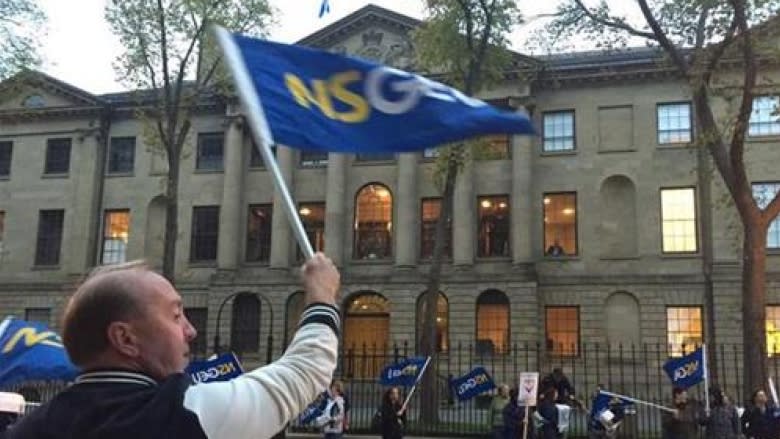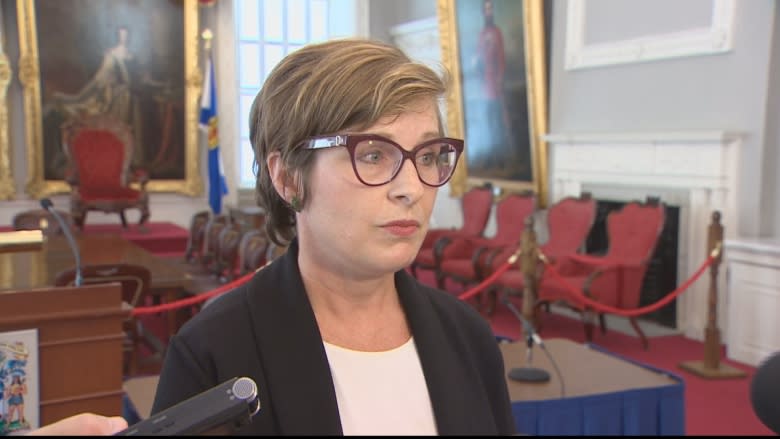Liberals proclaim bill to impose wage package on public sector unions
The provincial Liberal government is proclaiming Bill 148 on all public sector unions without a contract, effectively imposing a wage package on civil servants, health-care workers and anyone else yet to reach a contract agreement.
Labour Relations Minister Mark Furey made the announcement during a news conference Tuesday in Halifax. The Liberals held a rare Tuesday cabinet meeting during which cabinet ministers' signatures could be collected to proclaim the bill. There are 75,000 public sector workers in Nova Scotia.
"We did not take this option lightly," said Furey. "We've heard the position of labour. We've also heard the position of Nova Scotians."
By proclaiming the legislation, which was passed in December 2015, the government ensures an arbitrator cannot give the civil service, which is represented by the Nova Scotia Government & General Employees Union, or anyone else a wage package that exceeds the offer presented to all public sector unions.
While that offer has been accepted by some smaller unions and was imposed on teachers, contracts have yet to be reached with the civil service and health-care workers, two of the three major unions in the province. Furey said the move allows the two sides to now focus on issues that are not related to money.
The bill does not apply to physicians, physician residents and judges.
Union seeks arbitration
The NSGEU applied for arbitration earlier this month after last-chance talks with the government failed to produce an agreement.
While Bill 148 doesn't outright prevent arbitration, it does outline the parameters of the wage aspect of a contract.
In this case, as it's been with all other provincial public sector unions, the Liberal government's offer is a three per cent wage increase over four years, beginning with a two-year wage freeze. The government contends unions can gain more financially if additional savings can be presented, but that has yet to happen with any union.
The move also sees the end of the public service award, a lump-sum payment employees with at least 10 years of service receive upon retirement. It is frozen retroactive to April 1, 2015, and will not be offered to any new employees.
It's on that latter point NSGEU president Jason MacLean has been most strenuous, saying he and his members would not agree to any contract that sees previously-earned gains through bargaining clawed back.
While the move is perhaps not a surprise as it relates to the civil service, it will come as a surprise to many within health-care unions. Talks on that front have been very slow, with little progress to indicate a deal was near.
Higher surplus
Premier Stephen McNeil, meanwhile, has been steadfast since Bill 148 was first introduced that he would not allow an arbitrator to determine what his government could or could not afford to pay, something Furey again stressed Tuesday.
Although that argument was regularly made against the backdrop of Liberal concerns about the state of the province's finances, the recently released public accounts for fiscal year 2016-17 showed the government closed the books with a surplus $110 million higher than indicated in the April budget that was introduced but not passed before McNeil called the spring election.
That budget was also the second straight balanced budget introduced by the Liberals, something heavily touted during the election campaign.
Banking on election result
The move all but guarantees another round of protests when Province House opens next month and more bad blood with organized labour, something that's become a hallmark of McNeil's time as premier.
Government and party officials speaking on background said they believe the result of the last election — a second, albeit smaller, majority government — is a public endorsement of their approach.
While the Liberals have argued Bill 148 is a mechanism for preserving the government's "fiscal plan," critics have said the legislation would not withstand a court challenge and could end up costing the government millions of dollars in legal fees and other costs.
Tory Leader Jamie Baillie said the move does nothing but make lawyers rich while regular Nova Scotians struggle to find doctors and other necessary services.
"The games continue," he said. "We're now condemned to years of legal costs … because the government couldn't get the job done in the normal way."
A second opinion
The government also referred a constitutionality question today to the Nova Scotia Court of Appeal to see if the act violates the Charter of Rights and Freedoms. Furey said the government remains confident in the legislation.
But Dartmouth North New Democrat MLA Sue Leblanc said going to the courts should happen before proclamation, not after.
"It just speaks to non-confidence in their own bill."





